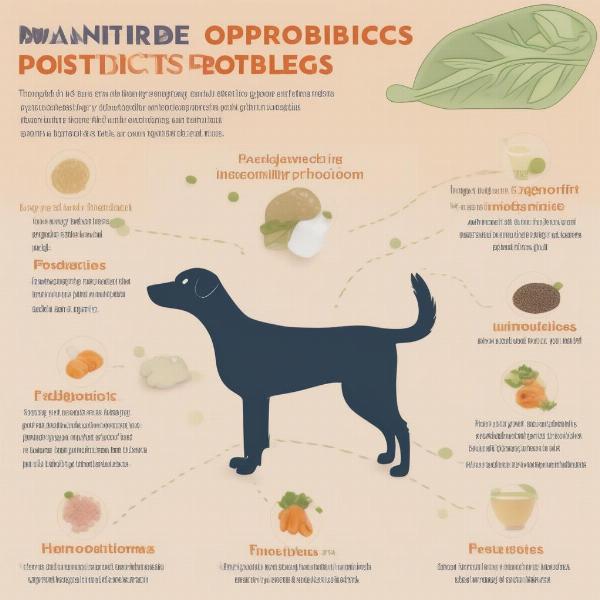Probiotics for dogs are becoming increasingly popular in Australia, and for good reason. These beneficial bacteria can offer a wide range of health benefits, from aiding digestion to boosting the immune system. Whether your furry friend is experiencing tummy troubles or you’re simply looking for ways to support their overall well-being, understanding the role of probiotics can be invaluable. This comprehensive guide will delve into the world of probiotics for dogs in Australia, covering everything from their benefits and uses to choosing the right product and potential side effects.
Understanding the Benefits of Probiotics for Dogs
Just like humans, dogs have a complex gut microbiome teeming with bacteria, both good and bad. Probiotics help maintain a healthy balance of these bacteria, which is crucial for optimal digestion and nutrient absorption. They can also help alleviate digestive issues like diarrhea and constipation, reduce gas, and improve stool quality. Beyond gut health, probiotics can also support the immune system, potentially reducing the risk of infections and allergies.
 Benefits of Probiotics for Dogs
Benefits of Probiotics for Dogs
Choosing the Right Probiotic for Your Dog in Australia
With a plethora of probiotic products available in Australia, choosing the right one for your dog can be overwhelming. Look for products specifically formulated for dogs, as human probiotics may not contain the appropriate strains or dosages. Consider the format – probiotics come in various forms, including powders, chews, capsules, and even incorporated into dog food.
Key Factors to Consider When Selecting a Probiotic
- Strain Specificity: Different strains of bacteria offer different benefits. Research the specific strains present in the product and their efficacy for the desired outcome.
- CFU Count: CFU (Colony Forming Units) indicates the number of live bacteria in the product. A higher CFU count generally suggests a more potent probiotic.
- Quality and Manufacturing: Opt for reputable brands that adhere to strict quality control standards.
- Storage Requirements: Some probiotics require refrigeration to maintain their viability.
How to Administer Probiotics to Your Dog
Administering probiotics is generally straightforward. Powders can be sprinkled onto food, while chews and capsules can be given directly or hidden in treats. Always follow the manufacturer’s instructions regarding dosage and frequency.
Potential Side Effects and Precautions
Probiotics are generally safe for dogs, but some may experience mild side effects like gas or loose stools, especially in the initial stages. If your dog experiences any adverse reactions, discontinue use and consult your veterinarian.
Are Probiotics Right for Your Dog?
Probiotics can be a valuable addition to your dog’s health regimen, especially if they suffer from digestive issues or have a weakened immune system. However, it’s essential to consult your veterinarian before starting any new supplement, especially if your dog has underlying health conditions. They can help determine the right probiotic and dosage for your dog’s specific needs.
Conclusion
Probiotics offer a natural and effective way to support your dog’s digestive and immune health. By choosing the right product and following the correct administration guidelines, you can help your furry friend thrive. Remember to consult your veterinarian for personalized advice and ensure the safety and efficacy of probiotic use for your dog.
FAQ
- What are probiotics for dogs? Probiotics are live microorganisms that, when administered in adequate amounts, confer a health benefit on the host. They help maintain a healthy balance of bacteria in the gut.
- Where can I buy probiotics for dogs in Australia? Probiotics are available at pet stores, veterinary clinics, and online retailers across Australia.
- How do I choose the right probiotic for my dog? Consider factors like strain specificity, CFU count, quality, and your dog’s individual needs. Consult your veterinarian for guidance.
- Can probiotics help with my dog’s diarrhea? Certain probiotic strains can help alleviate diarrhea in dogs.
- Are there any side effects of probiotics for dogs? Side effects are generally mild and may include gas or loose stools.
- How do I give probiotics to my dog? Probiotics come in various forms, including powders, chews, and capsules, which can be added to food or given directly.
- How long does it take to see results from probiotics? Results may vary, but some dog owners observe positive changes within a few weeks.
ILM Dog is your trusted international resource for all things canine. We offer expert advice on dog breeds, health, training, nutrition, grooming, and much more. Whether you’re a seasoned dog owner or just starting your journey, ILM Dog provides practical, reliable information to help you care for your beloved companion. For expert guidance on choosing the right products and accessories for your dog, contact us at [email protected] or call us at +44 20-3965-8624. Visit ILM Dog for more helpful tips and resources.